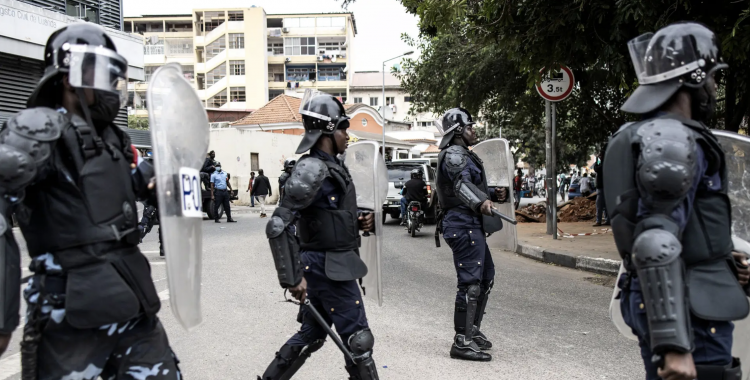Speaking to Lusa, Borralho Ndomba, a correspondent for the German international broadcaster Deutsche Welle, said that the arrest took place shortly after 11:00 am, when he was interviewing some young people near the Sant'Ana cemetery, where the march against the mandatory cut in schools, organized by student and pan-Africanist movements.
According to him, the journalist was surrounded, along with the young people he was interviewing, by the police and forced into a patrol car, having also been forced to hand over his professional license and the cell phone with which he was filming the interview.
In the vehicle, he added, there were three other young people, all of whom were taken to the 6th police station, in Rangel, where they were identified and detained for a few hours.
A few hours later, "they gave me back my things and asked me to leave," Borralho Ndomba said, adding that students were detained and beaten.
The information was confirmed to Lusa by the leader of the Angolan Student Movement (MEA), one of the entities that supported this initiative that aims to contest the mandatory haircut imposed by some schools.
Francisco Teixeira told Lusa that 14 students were detained, including four girls, regretting that the police had used "disproportionate force" to disperse young people who wanted to participate in the protest.
"When people were on their way to the concentration, the police decided to act and brutally attacked some young people, alleging that the demonstration was not authorized", criticized the student leader.
According to Francisco Teixeira, the police called the organizers of the march late on Friday afternoon to say that the Provincial Government of Luanda (GPL) had denied authorization for the protest, citing the lack of copies of the subscribers' Identity Cards as a reason.
A justification that the MEA leader questioned, taking into account that the GPL had been notified several days ago, but only the day before they were informed of the rejection, through the police.
The march aimed to protest against schools that prohibit in their internal regulations the use of long or curly hair, violating the constitution and the basic education law.
"Hair does not influence the learning process and is not a sign of being marginal", stressed Francisco Teixeira
"We are in an African country and hair is a way of identifying black people, it is a way of affirming our African spirituality and our culture," he added.
Some schools have barred access to students who wear curly hair or long hairstyles, in the case of boys, which has already led the Ministry of Education to intervene.
In a circular dated 28 September, the minister Luísa Grilo oriented schools to create "a harmonious environment of respect for difference and in the different ways in which each student's hair can be presented without, however, subverting the code of conduct and the school discipline".
He also underlined that the Education and Teaching System is governed by the principles of equality and child protection, provided for in the Constitution of the Republic, as well as by the principle of universality, provided for in the Basic Law of the Education and Teaching System "thus promoting the combating all types of discrimination on grounds of an individual's descent, sex, race, ethnicity, color, disability, language, place of birth, religion, political, ideological or philosophical convictions".
The circular also mentions that school managers must obey the laws and must ensure the materialization of the general principles that govern the Education System and promote "strategies of permanent dialogue with the members of the school community in order to establish rules of school coexistence that ensure the comprehensive protection of the child against all types of discrimination".
Union wants explanations from police about successive detentions of journalists
The Union of Angolan Journalists (SJA) demanded explanations from the National Police on Saturday about the successive detentions of journalists and admits the existence of express orders to obstruct the exercise of the profession, according to a press release.
The most recent case was that of the correspondent of the German broadcaster Deutsche Welle (DW), Borralho Ndomba, arrested while covering a student protest in Luanda "and taken to the police station under the seats of the police car".
Also in August, journalists from Voz da América and Rádio Ecclesia – respectively, Coque Mukuta and Cristóvão Luemba – were detained and prevented from carrying out their activities, the document recalls.
"The SJA vehemently condemns the abuse of authority by the National Police, present at the Sant'Ana Cemetery [place where the march was held], and would like to know if journalists need authorization, in light of the Constitution of the Republic and the Press Law, to cover any demonstrations", underlines the statement signed by the secretary general of the SJA, Teixeira Cândido.
The SJA considers that the successive arrests of journalists, without those responsible for the National Police detaching themselves from these acts, "legitimizes the Union's impression that there are express orders to obstruct the exercise of journalists".
"The SJA would not like to believe the thesis that the National Police, in Angola, is the enemy of press freedom", concludes the press release.
Journalist Borralho Ndomba was detained while covering a protest against the imposition of haircuts in schools, as were 14 students, all of whom have already been released.
Agência Lusa questioned the spokesman for the provincial command of Luanda and the Ministry of the Interior about the reason for the arrests, without receiving a response so far.







